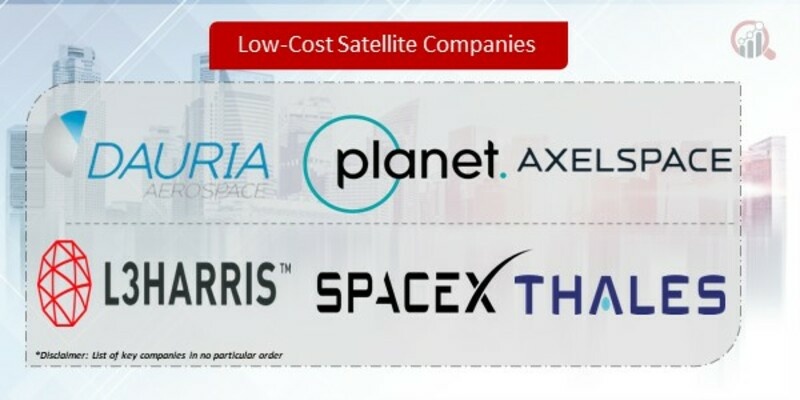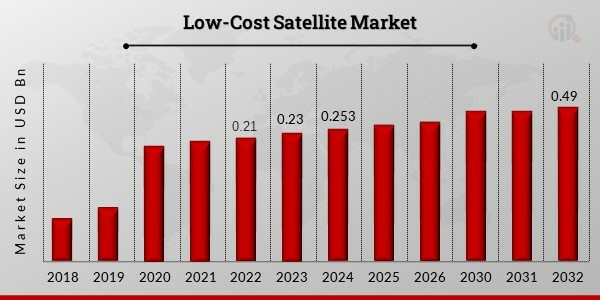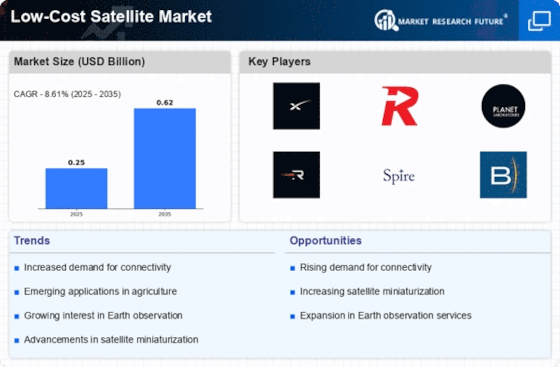Top Industry Leaders in the Low-Cost Satellite Market

Key Players
Dauria Aerospace (Russia)
Planet Labs Inc. (US)
Axelspace Corporation (Japan)
L3Harris Technologies Inc. (US)
SpaceX (US)
Thales Alenia Space (France)
Spire Global Inc. (US)
Bradford Space (US)
Sierra Nevada Corporation (US)
Lockheed Martin Corporation (US)
OneWeb (UK)
OHB AG (Germany)
Geooptics Inc. (US)
Strategies Adopted
One of the predominant strategies adopted by key players in the low-cost satellite market is the emphasis on miniaturization and standardization. Small satellites, commonly referred to as CubeSats or SmallSats, are designed to be more cost-effective and can be launched as secondary payloads. This approach allows companies to optimize launch costs and increase deployment frequency. SpaceX's rideshare program exemplifies this strategy, offering cost-effective launches for small satellite operators.
In addition to miniaturization, the reusability of launch vehicles has become a game-changer. Companies like SpaceX and Blue Origin have invested heavily in developing reusable rocket technology, drastically reducing launch costs. This strategy not only makes satellite deployment more economical but also fosters sustainability by minimizing space debris.
Factors for Market Share Analysis
Several factors influence market share analysis in the low-cost satellite market. Launch success rate and reliability are critical considerations, as satellite operators seek providers with a proven track record of successful deployments. The ability to offer a range of launch options catering to different payload sizes and mission requirements is another factor that contributes to market share.
Technological innovation plays a pivotal role in securing market share. Companies that invest in advanced technologies such as electric propulsion, advanced imaging sensors, and autonomous satellite operations gain a competitive edge. Flexibility in accommodating various orbits and mission profiles is also a key determinant, as it allows satellite operators to choose providers that align with their specific needs.
Furthermore, partnerships and collaborations with government space agencies and commercial entities contribute to market share. By forming strategic alliances, companies can access additional resources, expand their customer base, and participate in larger and more complex satellite projects.
New and Emerging Companies
The low-cost satellite market is witnessing the emergence of innovative startups aiming to disrupt traditional paradigms. Companies like Rocket Lab, with its Electron rocket, specialize in dedicated small satellite launches, providing tailored solutions for a growing market segment. Swarm Technologies is pioneering the development of tiny satellites for Internet of Things (IoT) connectivity, opening up new possibilities for global communication.
In addition to launch services, startups like Spire Global are focusing on data analytics and Earth observation services using constellations of small satellites. These emerging companies leverage advancements in technology and business models to carve out niches in the market, challenging established players and introducing novel solutions to meet evolving industry demands.
Industry News
Recent developments in the low-cost satellite market include the expansion of satellite constellations for global broadband coverage, Earth observation, and scientific research. SpaceX's Starlink project, aiming to provide high-speed internet globally, has garnered significant attention, demonstrating the market's appetite for large-scale satellite constellations. OneWeb, in collaboration with Arianespace, has made strides in deploying its own broadband satellite constellation, contributing to the race for global connectivity.
Government initiatives, such as NASA's CubeSat Launch Initiative (CSLI), further propel the industry by supporting educational institutions and small companies in launching CubeSats for scientific research and technology demonstration. These initiatives foster innovation and create opportunities for new entrants to showcase their capabilities.
Current Company Investment Trends Investment trends in the low-cost satellite market reflect the industry's recognition of the increasing demand for affordable satellite solutions. Companies are channeling investments into research and development to enhance satellite capabilities, reduce launch costs, and improve overall mission success rates. Reusable launch vehicle technology continues to attract significant investments, with companies recognizing the long-term cost benefits and sustainability advantages.
In addition to launch technologies, investments are pouring into satellite manufacturing, communication systems, and Earth observation capabilities. With the advent of advanced sensors and artificial intelligence, there is a growing focus on enhancing the data-gathering and analytics capabilities of small satellites. Investors are keen on supporting companies that can provide valuable data and services for a wide range of applications, including agriculture, climate monitoring, and disaster response.
Overall Competitive Scenario
The low-cost satellite market is marked by the dominance of key players like SpaceX, Planet Labs, and Blue Origin, who have reshaped the industry with innovative strategies. Miniaturization, standardization, and reusable launch vehicle technology are key trends defining the competitive landscape. Factors influencing market share include launch success rate, reliability, technological innovation, and the ability to offer diverse launch options.
Emerging companies bring fresh perspectives and specialized solutions, contributing to the dynamism of the market. Industry news highlights the growth of satellite constellations for global connectivity and Earth observation, while government initiatives support innovation and educational endeavors. Current investment trends underscore the industry's commitment to advancing satellite capabilities, reducing costs, and exploring new frontiers in space exploration.
As the low-cost satellite market continues to evolve, companies that can navigate the complexities of space exploration, embrace technological advancements, and address the diverse needs of satellite operators are poised to thrive in this competitive and transformative space sector.
Recent News
SpaceX (SPCE)
Launched its Starlink constellation of thousands of miniaturized satellites, aiming to provide affordable and ubiquitous internet access worldwide.
Secured major contracts with airlines and governments to provide in-flight Wi-Fi and remote connectivity, expanding their reach and market share.
Planet Labs Inc. (PL)
Deployed hundreds of Doves, their signature Earth imaging nanosatellites, offering high-resolution data for agriculture, environmental monitoring, and disaster response.
Announced partnerships with data analytics companies to offer insights and solutions derived from their vast satellite imagery database.
Spire Global Inc. (SPIR)
Launched dozens of Lemur nanosatellites for weather and climate monitoring, providing critical data for weather forecasting and climate studies.
Collaborated with maritime and shipping companies to offer real-time vessel tracking and weather insights, improving operational efficiency and safety.











